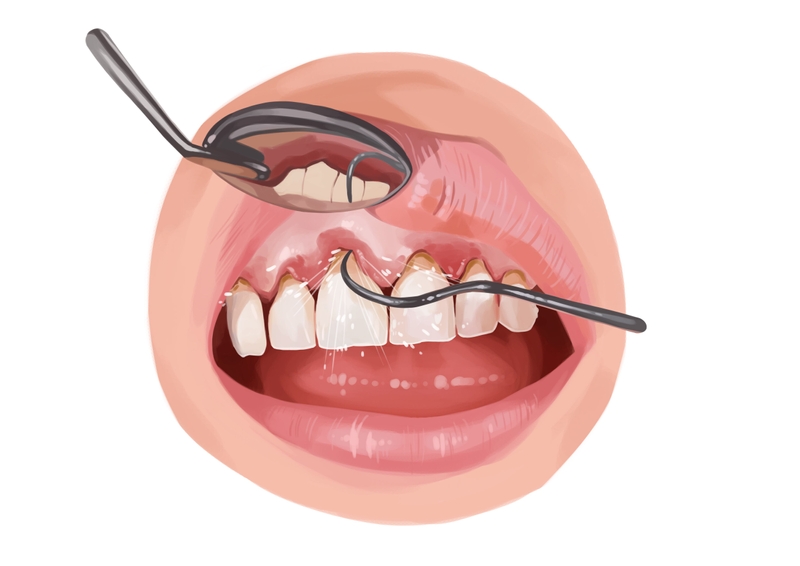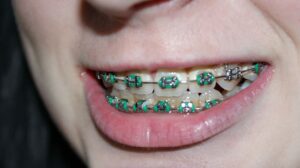Bone loss in teeth is more common than you might have imagined. It can lead to tooth loss and resultant problems with chewing and talking. Please keep reading to learn what causes bone loss in teeth and how you can treat and prevent it.
What is the cause of bone loss in teeth?
In most cases, bone loss in teeth occurs due to periodontitis, which is an advanced form of gum disease. Here’s how it happens:
- Plaque forms on your teeth when you eat sugary and starchy foods that feed the bacteria in your mouth. Brushing your teeth twice a day keeps the plaque in check and prevents it from becoming a bigger problem.
- If you don’t brush twice a day and floss every day, the plaque on your teeth can harden into tartar, which is more difficult to remove. You need to go in for a professional dental cleaning to get tartar removed.
- Plaque and tartar can cause other problems in your mouth, such as gingivitis, which is the mildest stage of gum disease. (Gingiva means gum, and -itis means inflammation). Good oral care at home and professional teeth cleanings can reverse gingivitis.
- If the gum irritation and inflammation are left untreated, gingivitis can progress to periodontitis. This is an advanced stage of gum disease in which deep pockets develop between the teeth and gums. There is debris in these pockets consisting of plaque, tartar, and bacteria. Eventually, periodontitis leads to deep infections, loss of gum tissue, and bone loss in teeth. You could end up losing one or more of your teeth because the supporting bone has been eroded away. Without treatment, the ongoing inflammation can put a strain on your body’s immune system and cause health problems in other parts of your body.
Besides poor oral hygiene, other risk factors for periodontitis and bone loss in teeth include smoking, genetics, hormonal changes, and certain health conditions like cardiovascular disease, diabetes, and arthritis.
What stage of gum disease causes tooth loss?
As mentioned, an advanced stage of gum disease called periodontitis can cause pockets to form between the gums and teeth. This can cause the gums to pull away from the teeth, leading to bone loss, loosening of the teeth, and eventually, the teeth falling out.
How do I know if I have dental bone loss?
Only your dentist can diagnose dental bone loss with an examination of your mouth and dental x-rays. However, symptoms of gum disease (periodontitis) are an indication that you may have bone loss in teeth that needs to be treated as soon as possible. Periodontitis symptoms include bad breath, red, swollen, painful, and bleeding gums, gum recession, gaps between the teeth, loose teeth, and tooth loss.
Is dental bone loss common?
Dental bone loss is common, especially in older adults and people with poor oral hygiene. As noted above, periodontitis is the main cause of bone loss in teeth, and this condition affects over 45% of Americans over the age of 30 and 70% of Americans 65 years and older.
What age does dental bone loss start?
Dental bone loss starts at around age 30. Various factors can lead to it, such as hormonal changes and changes in the mineral content of bone with age.
How serious is bone loss in teeth?
Bone loss in teeth and jaws is very serious. It can lead to tooth loss, which can make it difficult for you to eat and speak, If left untreated, it can also increase your risk of other health problems like heart attack and stroke.
How can I regrow my gum bone naturally?
Unfortunately, gum tissue does not regenerate and receding gums do not grow back. However, treatment for tooth decay and periodontitis can lead to a reversal of bone loss in teeth. Your dentist can also perform bone grafting in areas of jawbone atrophy.
Can you recover from bone loss in the jaw?
With proper treatment, you can recover from bone loss in the jaw. If you have periodontitis, your dentist may recommend antibiotics to treat an infection. They will likely perform scaling and root planing (professional dental cleaning done using anesthesia to numb the gums). For moderate to severe periodontitis, you may need to undergo flap surgery (this allows the dentist to examine your tooth roots more closely). Other treatment options include gum grafts, dental bone grafts for bone loss in teeth, guided tissue regeneration, and platelet-rich plasma (PRP).
What vitamin is good for the jaw bone?
Vitamin D is good for your bones, including your jaw bone. This vitamin helps the body absorb calcium, which is one of the main minerals in bones.
What foods help bone loss in teeth?
Calcium-rich foods like dairy products, tofu, nuts, dark green leafy vegetables, canned salmon, and fortified orange juice help promote strong teeth and bones.
How do you stop bone loss in teeth?
The best way to stop bone loss in teeth and keep your bones strong is to:
- Brush your teeth twice a day for 2 minutes with a soft-bristled toothbrush.
- Use dental floss daily to clean between your teeth.
- Replace your toothbrush every 3-4 months.
- Eat a diet rich in calcium and vitamin D to support bone health.
- Maintain a healthy weight.
- Quit smoking.
Oral hygiene is the single most important thing you can do to keep your mouth healthy and prevent bone loss in teeth. Visit your dentist every 6 months for teeth cleaning and regular checkups. If you suspect you may have gum disease, see your dentist as soon as possible. You may be referred to a specialist called a periodontist. Express Dentist has a nationwide network of trusted dental professionals. Call us today if you’re worried about bone loss in teeth, and we’ll put you in touch with a dentist in your area so you can get the treatment you need.
About the author

Dr. Greg Grillo
Dr. Greg Grillo DDS studied at the University of Washington where he received a bachelors degree with Honors and later attended dental school on the same campus. Following school Dr. Greg served in the United States Navy as a dental officer. During this time he received advanced training in specialty areas of dentistry while also treating families of members of the military.
As well as sharing valuable information on dentistry and oral health, Dr. Greg remains a practicing dentist to this day. He works with families in the Okanogan Valley where he lives with his wife and three children.





